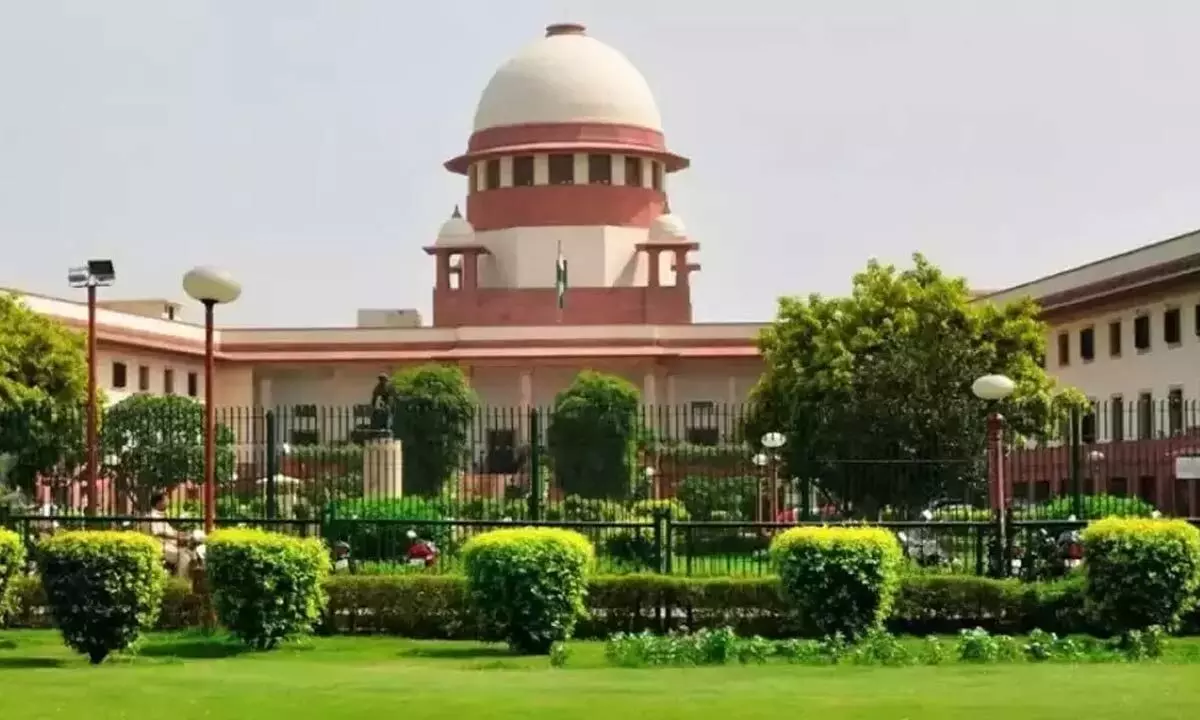Live
- Empowering Tomorrow's Voters: Meru Students Lead Civic Duty Postcard Campaign
- Boost Your Immunity Naturally this Summer
- Nothing Phone 2a Blue Variant Launched: Price, Specifications and Offers
- Exploring the timeless allure of heritage Indian clothing
- Large caps dominate as Sensex gains more than 800 points
- Viksit Bharat Ambassador: Participants hail initiative, feel proud to be citizens of fifth largest economy
- JP Nadda Highlights BJP's Development Agenda and Achievements in Kothagudem
- Apple iPad Event: New Apple Pencil to Feature Haptic Feedback and Enhanced Gestures
- ICC T20 World Cup 2024: Kane Williamson to lead New Zealand, Conway, Ravindra, Henry included
- Assurances given by TDP-- Govinda..Govinda..'
Just In
SC refers pleas challenging validity of sedition law to Constitution Bench

The Supreme Court on Tuesday ordered that the batch of petitions challenging the constitutionality of the colonial-era penal provision of sedition be placed before the Chief Justice of India (CJI) for notifying a Constitution Bench having a strength of at least five judges.
New Delhi: The Supreme Court on Tuesday ordered that the batch of petitions challenging the constitutionality of the colonial-era penal provision of sedition be placed before the Chief Justice of India (CJI) for notifying a Constitution Bench having a strength of at least five judges.
During the hearing, a bench headed by CJI D.Y. Chandrachud and comprising Justices J.B. Pardiwala and Manoj Misra, mulled that the proposed five-judge bench may consider if the earlier judgment rendered in Kedar Nath case upholding the constitutionality of Section 124A (sedition) of the IPC requires a reconsideration by a larger bench of seven judges.
In 1962, the Constitution Bench in the Kedar Nath Singh case upheld the validity of Section 124A saying that the state needs protection from the forces who seek to jeopardise its safety and stability.
Senior advocate Kapil Sibal, appearing for the petitioners challenging validity of the penal provision, requested the CJI-led bench to directly refer the batch of pleas to a seven-judge Constitution Bench without sending the matter before a bench of five judges, adding that adjudication by court cannot await a law by Parliament.
Solicitor General Tushar Mehta, representing the Centre, urged the top court to defer proceedings as the Bharatiya Nyaya Sanhita (Indian Penal Code (IPC)) Amendment Bill is pending before the Parliamentary Standing Committee on home affairs for consideration.
The Bharatiya Nyaya Sanhita Bill was tabled before Parliament on August 11 proposing a comprehensive overhaul of the British-era penal code.
The Bill, along with the Bharatiya Nagrik Suraksha Sanhita Bill which seeks to replace the CrPC and the Bharatiya Sakshya Bill, 2023 which seeks to replace the Indian Evidence Act, was referred for consideration of the Parliamentary Standing Committee on home affairs.
In the new code, the term ‘sedition’ is missing but similar offences such as one under Section 150 duly finds its place.
On May 11 last year, in a path-breaking order, the Supreme Court directed the Centre and all the state governments to refrain from registering any FIR or taking any coercive measures, while suspending all continuing investigations in relation to the Indian Penal Code's Section 124A (sedition), and also directed that all pending trials, appeals, and proceedings be kept in abeyance.
The apex court in its prima facie observation, had opined that the rigours of Section 124A of IPC were not in tune with the current social milieu, and were intended for a time when this country was under the colonial regime.
In May, Attorney General R. Venkataraman had urged the top court to schedule the matter for hearing after the monsoon session of the Parliament.
In the following month, the Law Commission, in its report to the government, had advocated for retention of the penal provision dealing with sedition, saying that "colonial legacy" is not a valid ground for its repeal.
The panel recommended model guidelines curbing the misuse of section I24A of IPC and said that amendments could be introduced to bring about greater clarity regarding usage of the provision.

© 2024 Hyderabad Media House Limited/The Hans India. All rights reserved. Powered by hocalwire.com






